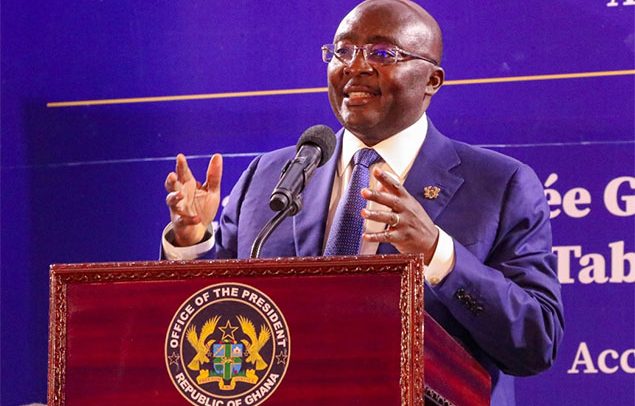Dr. Mahamudu Bawumia
VICE PRESIDENT Dr. Mahamudu Bawumia has indicated that fossil fuels, particularly natural gas, will continue to be part of Ghana’s energy mix in the short term, while strategies are being put in place to increase the country’s share of renewable energy in the mix from medium to long term.
According to him, even though the government is fully committed to achieving net zero carbon emissions by 2070, the nation also has to take steps to accelerate the production and utilisation of Ghana’s oil and gas reserves.
Addressing the 5th edition of the Ghana International Petroleum Conference (GhIPCon) in Accra yesterday, Dr. Bawumia explained, “What this means is that even though we want to contribute to reducing emissions, we are of the view that a balance must be struck and maintained in the context of our social, economic, and environmental requirements.”
“Let me add that Ghana has set a target of 2070 to fully transition from fossil fuels to renewable energy,” he noted, and urged stakeholders in the energy sector to be forward thinking in a rapidly changing world, “not only in terms of energy transition, but in terms of all aspects of the energy mix.”
The Vice President asked, for example, “how do we insulate the energy sector from global economic shocks, especially considering how the Russia-Ukraine war has affected the energy sector in the last few months?”
He said he expected the conference to become a sounding board for the governments in the West Africa Region on how they could be full participants in the energy transition process, while remaining faithful to the needs and aspirations of the continent’s citizens.
“In a globalised world, we should not assume that just those of us gathered in this room are the participants in GhIPCon. As we speak, I am certain that the proceedings are being watched or listened to live, across the world. So, our conclusions will have ramifications for energy sector players across the world,” he asserted.
Chief Executive Officer of the National Petroleum Authority (NPA), Dr. Mustapha Abdul-Hamid, explained that energy transition is the pathway toward transformation of the global energy sector from fossil-based fuel to zero carbon, and every country on earth is obliged, under the Paris Agreement, to reach this net zero emissions in the second half of this century.
He disclosed that Africa’s petroleum downstream sector was entering a new era, pointing out that “as the world looks to accelerate its transition away from fossil fuels, the pressures on our industries are mounting.”
“We are all exposed to the global energy transition, as our countries depend on oil and gas revenues,” he posited.
He said Ghana’s petroleum downstream industry, which has an annual sales value of about GH¢32.94 billion according to 2021 estimates, contributes 7.2% of the country’s GDP.
He noted that this represents a 41% increase in demand for fossil fuels as compared to 2020, and continued, “This is an unprecedented surge in consumption of fossil fuels when the annual average over the years had been between 5% and 7%.”
A Deputy Minister of Energy, William Owuraku Aidoo, who represented the Energy Minister, said while the need to transition to net zero greenhouse gas (GHG) emissions is accepted as a collective action necessity, the challenge for most countries, particularly in Sub-Saharan Africa, has been how to transition, and indeed at what rate, to avoid disrupting local economies and to mitigate transition risks for developing economies.
According to him, Ghana’s Energy Transition Plan, spearheaded by the Energy Ministry, outlines a roadmap with a national character to decarbonise the energy sector and reach net zero emissions by 2070 while ensuring socio-economic growth and the efficient use of Ghana’s natural resources.
“LPG, natural gas, hydrogen gas and biofuels blended with petroleum products are expected to play a major role in Ghana’s energy transition agenda in the petroleum downstream sector, and the ministry is putting in place the necessary fundamentals to ensure its plan moves from an ambition to a reality,” he stated.
The three-day conference, which was held on the theme: “Energy Transition in the African Petroleum Downstream Context: Prospects, Challenges and the way Forward”, comes on the heels of the inauguration of the National Energy Transition Committee by Ghana to draft a framework geared towards achieving net zero carbon emissions by 2050.
BY Ernest Kofi Adu

